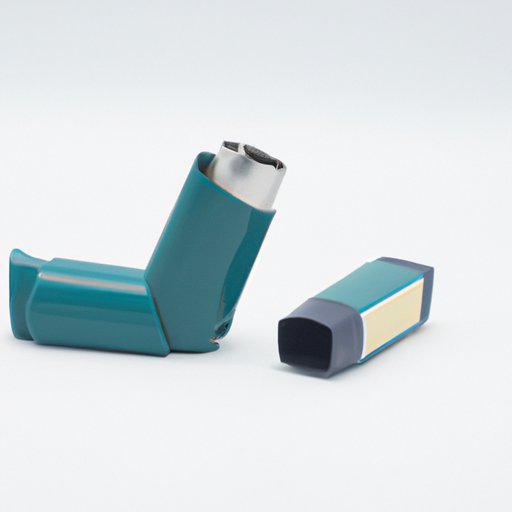
Introduction
If you suffer from asthma, you know that having a working inhaler is crucial in managing your symptoms. However, have you ever wondered if you can still use an expired inhaler? Maybe you found an old inhaler lying around, or you’re trying to save money by using an expired one. Whatever the reason, it’s important to understand the risks and dangers of using expired inhalers. In this article, we’ll explore the topic of using expired inhalers in-depth to help you make informed decisions about your asthma management.
Is it Safe to Use an Expired Inhaler?
The short answer is no. While using an expired inhaler may not immediately harm you, it’s not worth the risk. Inhalers are designed to deliver specific doses of medication, and over time the medication can break down, making the inhaler less effective. This means that you may not be getting the proper dose you need to manage your asthma effectively.
Beyond lowered effectiveness, expired inhalers pose other potential problems. In some cases, the medication inside can begin to deteriorate and form harmful compounds that can irritate the lungs. The propellant used in inhalers can also lose its potency over time, making it difficult to inhale the medication properly.
In one study, researchers found that expired inhalers had a significant reduction in drug content and aerodynamic particle size, two critical factors in determining the effectiveness of an inhaler. Overall, it’s not worth the potential risks to use an expired inhaler.
The Surprising Truth about Expired Inhalers
Inhalers expire for various reasons, primarily due to the active ingredients within the medication becoming less effective over time. Inhaled medications are sensitive to heat, light, and humidity, which can cause them to break down over time. Beyond the medication itself, the propellant used in inhalers can also lose its potency. As a result, the inhaler may not deliver the medication correctly, leading to reduced effectiveness for asthma sufferers.
It’s worth noting that not all inhalers expire at the same rate. Some inhalers can last for years, while others only last for a few months. The expiration date is usually indicated on the packaging or the canister itself.
Why You Shouldn’t Use an Expired Inhaler
While some might argue that using an expired inhaler is better than using no inhaler at all, the potential risks simply aren’t worth it. An expired inhaler may not deliver the medication you need to control your asthma, leading to symptoms like shortness of breath, chest tightness, and wheezing.
Furthermore, using an expired inhaler can have long-term consequences for asthma management. If you rely on your inhaler to manage your symptoms, using an expired inhaler can lead to uncontrolled asthma and even asthma attacks. Without proper asthma management, you’re more likely to experience worsening symptoms, which can be dangerous.
Don’t Risk Your Health: Understanding the Dangers of Expired Inhalers
Consider the following scenarios:
- You’re feeling tightness in your chest and grab your expired inhaler, hoping it will provide relief. Unfortunately, the medication inside is no longer effective, and you don’t get the relief you need.
- You’re on a hike and experience symptoms of an asthma attack. You reach for your inhaler, only to find out that it has expired and won’t provide the necessary dose to help you breathe better.
Both of these scenarios illustrate why using an expired inhaler is dangerous. As an asthma sufferer, your inhaler is your lifeline, and using an expired inhaler puts you at risk of worsening symptoms and potentially deadly asthma attacks.
When to Toss the Inhaler: A Guide for Managing Asthma Medications
So, how do you know when it’s time to replace your inhaler? First and foremost, always check the expiration date before using an inhaler. If the expiration date is past, don’t use it.
It’s also essential to properly manage your asthma medications to ensure you always have access to a working inhaler. Keep track of expiration dates and refill your prescription before you run out. Store your inhaler in a cool, dry place, away from direct sunlight.
If you’re not sure of an inhaler’s efficacy, you can speak to your doctor or pharmacist for guidance. In some cases, a healthcare professional may perform an inhaler efficacy test to determine if your inhaler is still working correctly.
The Science of Expired Inhalers: Separating Fact from Fiction
There are many myths and misconceptions surrounding the use of expired inhalers. Some people believe that using an expired inhaler is better than not using one at all, while others think that if an inhaler is stored in ideal conditions, it will last forever. Both of these beliefs are simply untrue.
The fact is that inhalers expire for a reason, and that reason is that the medication inside degrades over time, reducing the inhaler’s potency. While using an expired inhaler may not harm you immediately, it’s not worth the risk.
Conclusion
Using an expired inhaler is never a good idea. While it may be tempting to try and save money or use what you have on hand, the potential consequences aren’t worth it. Understanding the risks and dangers of using an expired inhaler is critical in managing your asthma effectively.
To keep yourself safe, always check the expiration date before using an inhaler, and properly manage your asthma medications to ensure you always have access to a working inhaler. By following these guidelines, you can take control of your asthma and live a healthy, symptom-free life.





